These States Rank Highest in General Competitiveness

Ever felt the urge to be the first one to grab the latest smartphone or beat everyone to the exit during rush hour? You're not alone. Life's become a race, from snatching job promotions to being the first car to catch a green light.
Whether it’s because of peer pressure, a short attention span, or simply a competitive nature, people act like life’s a contest all the time.
Solitaire Bliss conducted a survey to determine where in America people are most competitive. In our survey, we asked nearly 2,000 individuals about the myriad ways they act competitively in their everyday lives. Where are people most cutthroat, and which states house the most laid-back citizens? Let's dive in and uncover the truth about America's most competitive states.
Key Findings
- The most competitive states are New Jersey, Virginia, and Connecticut.
- New Mexico, Kansas, and Minnesota are home to the most laid-back Americans.
- For 2 in 5, their competitive nature has caused extra stress in their life.
- Americans are most competitive when it comes to driving (65%), recreation (35%), and the workplace (27%).
What Americans Are Competitive About
Americans display a wild range of competitive spirit in the arena of life. When it comes to driving, a whopping 65% of Americans take the wheel as if they're in a high-stakes race, leaving no road unchallenged.
This intense competitiveness isn't limited to the roadways. In fact, 35% of Americans demonstrate a fierce determination in recreational activities, treating even a casual game of Monopoly with the intensity of a life-or-death showdown. This is closely followed by the 27% who bring this competitive spirit into the workplace.
On the flipside, when it comes to home appearance, most Americans are pretty chill. Just over 1 in 5 folks get competitive about their lawns or transform their homes into holiday wonderlands that could give the Griswolds a run for their twinkle lights.
Health and fitness is a bit of a friendly competition with 1 in 5 folks admitting to being competitive, and the realm of finance isn't too different, with almost a quarter of Americans engaging in some form of fiscal rivalry.
But here's the kicker—all this competition isn't without its consequences. A noteworthy 2 in 5 confess that their competitive edge has driven them to the edge of stress, leaving them pondering the age-old question: Is winning really worth it?
The Most Competitive People Are in New Jersey
Before we dive into state-by-state specifics, let's clarify the score system. The closer a state's score is to 100, the hotter the competition in that state.
New Jersey takes the top spot with a scorching score of 81.28. These folks are masters at keeping an eye on their competition to make sure they're doing better, especially when it comes to health and fitness.
Virginia isn't far behind, where merging on the highway can feel like a battle for supremacy, with 81% of residents racing to the front of the pack. Meanwhile, Connecticut clocks in as the top state for workplace competition, where they're not afraid to make a coworker look bad or be the first to hit "send" in a group email just to show extra dedication.
In Iowa, catching green lights is serious business, with 83% of residents accelerating like they're in a drag race. Finally, Nebraska residents take the prize for the guiltiest early birds and night owls at the office, as they arrive early and stay late just to outshine their coworkers.
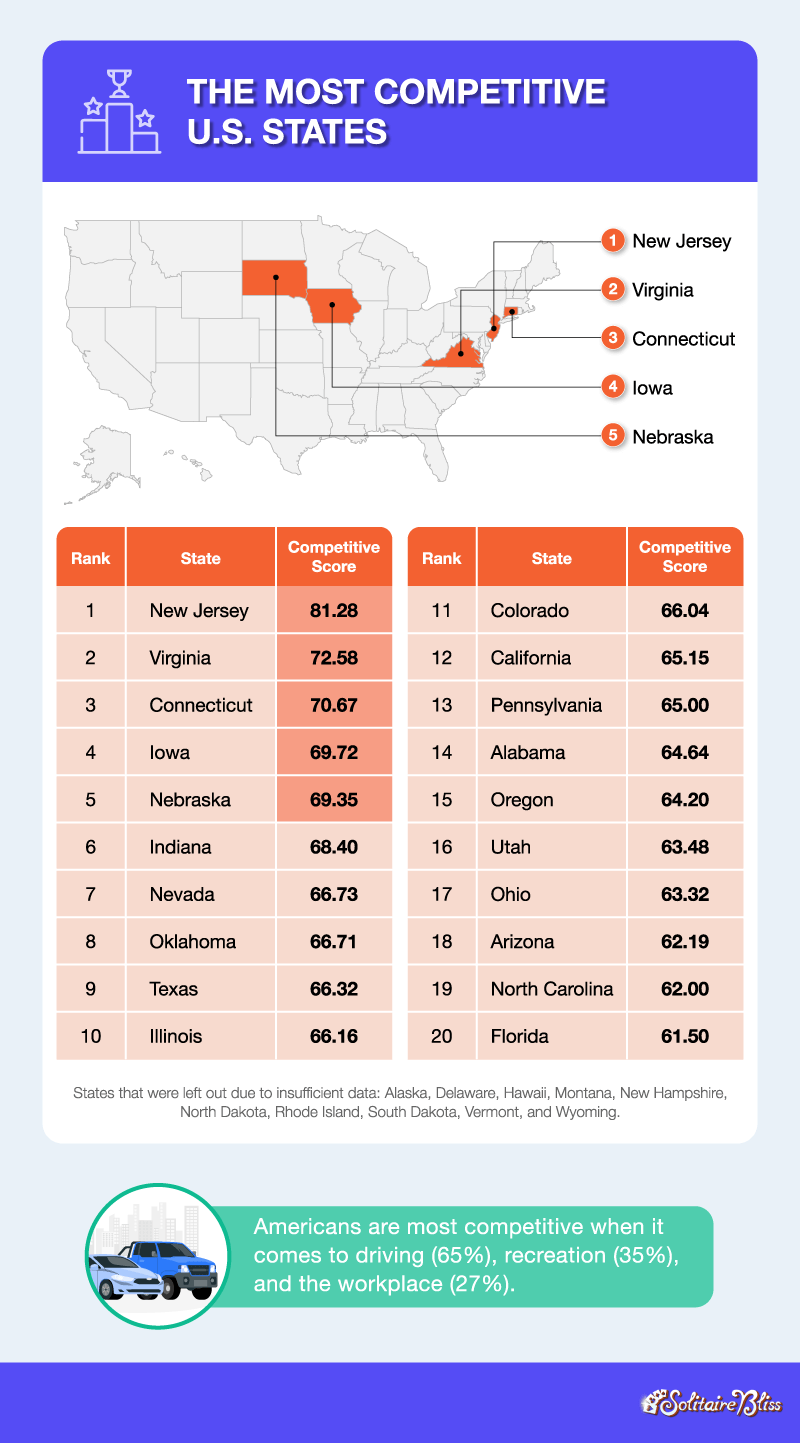
New Mexico Is the Most Laid-Back
In our journey across the most laid-back states, we start with New Mexico (47.24), where the Land of Enchantment truly lives up to its name.
This southwestern state exudes a mellow vibe, with only 12% of its residents arriving early or staying late at work to outdo a colleague. When it comes to bragging about finances, impressively, New Mexico residents are also the least likely to engage in conspicuous consumption, with just 2% buying luxury items solely for the purpose of impressing others.
Next on our easygoing tour is Kansas (49.56), where residents prefer to take things slow on the road. Less than half (48%) of Kansans admit to accelerating to prevent others from merging, earning them the distinction of being the last state for cutthroat driving, with a whopping 58% avoiding competitiveness on the road. Furthermore, Kansans aren't easily influenced by others' diet and fitness routines, with just 32% allowing such external factors to impact their own efforts. Health and fitness don't seem to be a priority here, as only 13% actively participate in competitive fitness endeavors.
In Minnesota (53.88), a cool and collected atmosphere prevails. Here, you won't find many folks racing to hit "send" on a group email just to prove their dedication, as only 29% indulge in such workplace antics. Instead Minnesota ranks highest in embracing the positive side of competition, with 60% allowing others' diet and fitness routines to inspire their own hard work.
Moving south to Mississippi (55.45), courtesy reigns on the road, with only 50% occasionally putting the pedal to the metal to prevent others from merging. Similarly, the realm of fitness and health is not marked by fierce competition, as just 22% of Mississippians feel the need to outdo others in this domain.
Lastly, in Georgia (56.57), the majority take a leisurely approach to driving, with 57% avoiding the urge to speed up and block merging cars. In the workplace, only 27% of Georgians are actively competitive, making it a relatively easy going environment compared to some other states. They seem to value cooperation over cutthroat tactics.
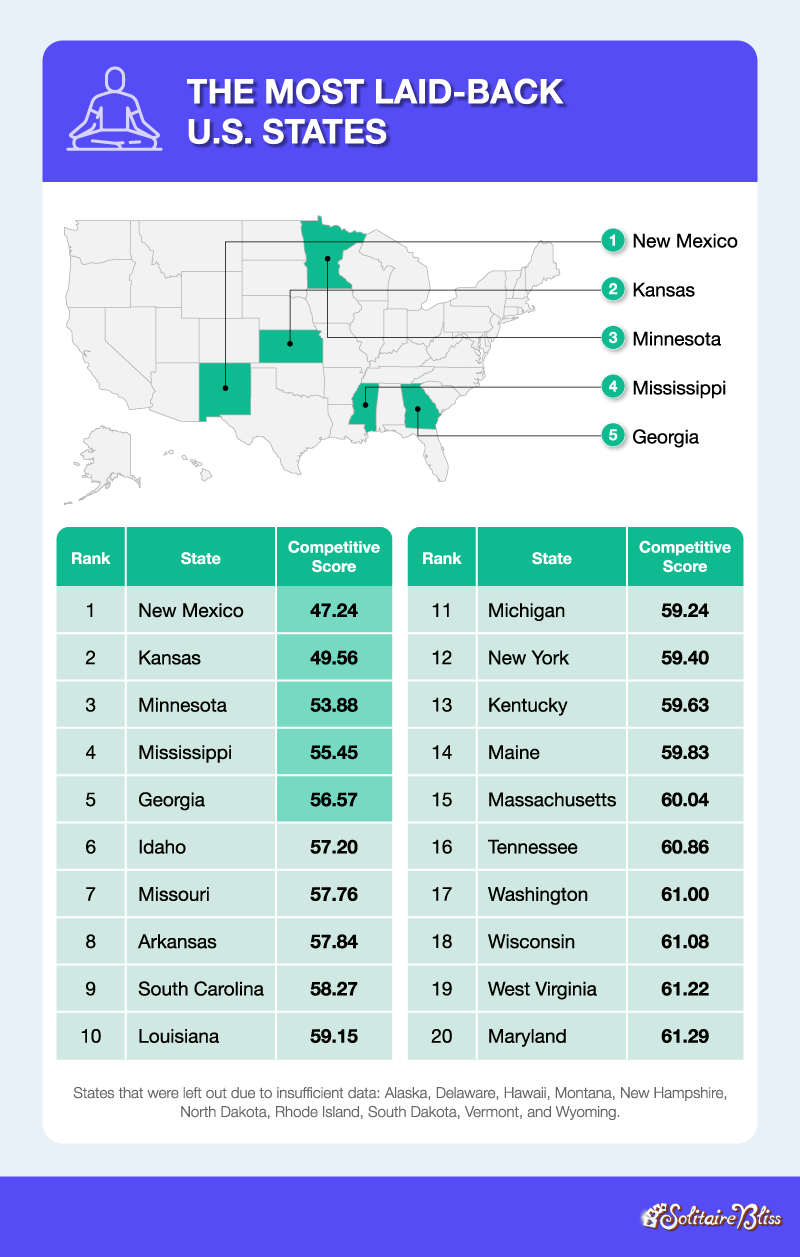
1 in 7 Sabotage Coworkers to Make Themselves Look Better
For starters, it's notable that over 1 in 4 Americans admit to putting in extra hours at work, either arriving early or staying late, with the sole aim of outperforming their coworkers. Men seem to have a slightly stronger penchant for this competitive attitude, with 27% doing so, compared to 24% of women. The generational breakdown reveals that Gen X leads the pack in this aspect, with 29% embracing the overtime grind. Millennials (26%), boomers (23%), and Gen Z (21%) follow in the competitive race for workplace dominance.
Surprisingly, 1 in 7 Americans have taken the extreme step of intentionally making a coworker look bad in order to shine brighter themselves. Men (15%) are slightly more prone to this tactic than women (12%).
When it comes to being the first to respond to work messages as a sign of dedication, over 2 in 5 Americans are guilty of this behavior. Among generations, millennials (47%) are the most eager to showcase their dedication by being the quickest to reply, followed by Gen Z (44%), Gen X (39%), and boomers (33%).
Turning our attention to the states with the most competitive workplaces, Connecticut (37.25%) takes the lead, where the spirit of rivalry seems to thrive in office spaces. New Jersey (34.67%) isn't far behind and Iowa (34.00%) also stands out as a place where the competition at work is notably intense.
On the flip side, states with the least competitive workplaces appear to prioritize a more laid-back atmosphere. New Mexico (17.46%) tops this list, followed by Minnesota (18.06%) and Kansas (18.67%).
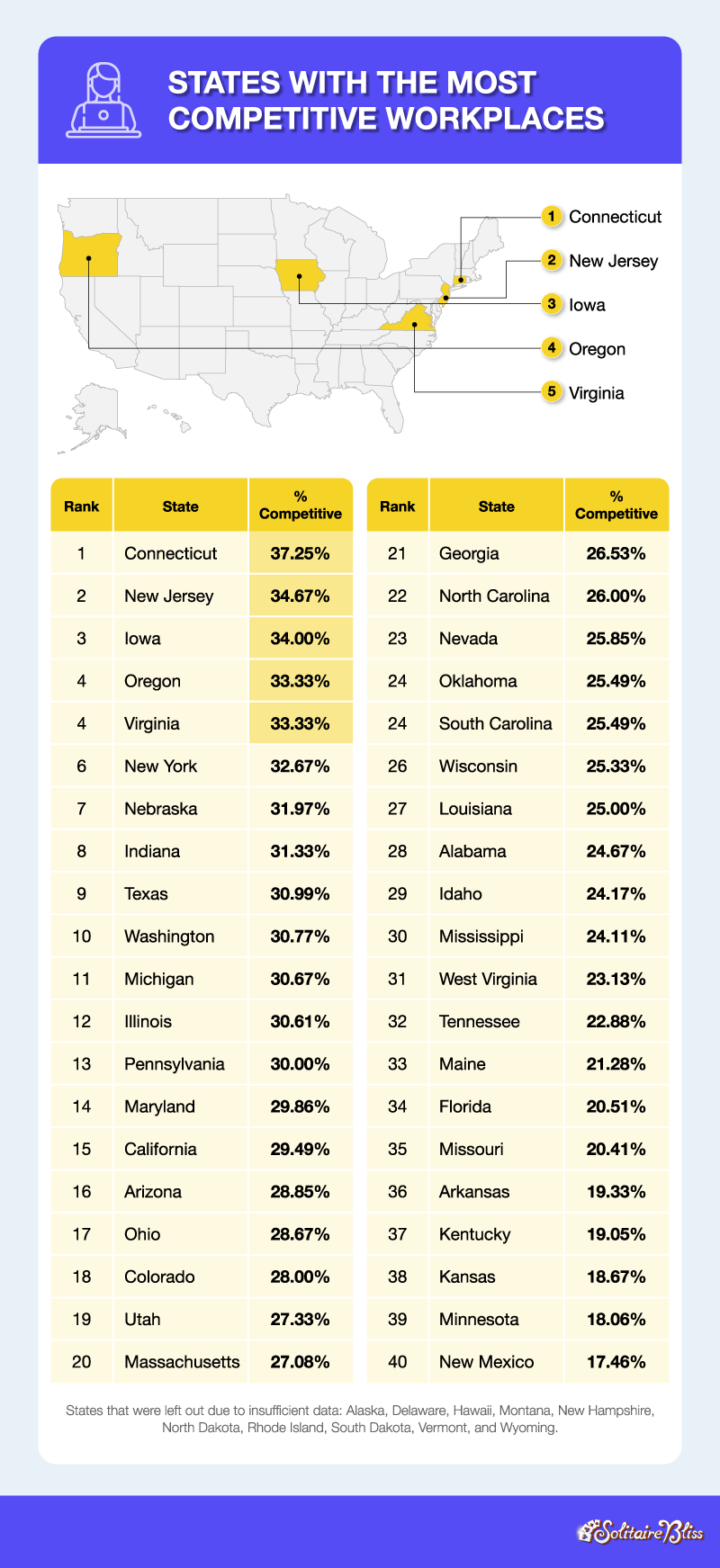
While Driving, 61% Speed Up to Prevent Other Cars from Merging Ahead of Them
A whopping majority (61%) of Americans confess to speeding up just to prevent another car from merging in front of them. Interestingly, women (67%) are slightly more likely to engage in this form of road rivalry than men (65%). The generational breakdown reveals that Gen X (69%) takes the lead in this style of driving, followed closely by millennials and Gen Z (67%), with boomers (57%) trailing behind.
Another intriguing phenomenon on the road is the satisfaction derived from passing a car that had previously passed you—a significant 63% of drivers admit to feeling a sense of triumph when this happens. This sense of satisfaction is more pronounced among women, with 71% experiencing it, compared to 64% of men. Among generations, Gen Z (74%) feels this satisfaction most strongly, followed by millennials and Gen X (69%), while boomers (54%) are less affected by this competitive emotion.
A vast majority (72%) of drivers have accelerated to catch a green light or beat a yellow one, even when they weren't in a particular rush. This behavior is evenly split between men and women, with both genders equally guilty of this competitive tendency (77%). Millennials (79%) are the most likely culprits when it comes to this aggressive driving tactic, closely followed by Gen X (78%), Gen Z (75%), and trailing slightly behind, boomers (70%).
Now, let's explore the states with the most competitive drivers. Virginia (80.85%) tops the list, followed by Illinois (78.63%) and Idaho (78.38%).
Meanwhile, states with the least competitive drivers are a haven for those who prefer a more relaxed approach to driving. Kansas (58.00%) leads the pack, followed by Mississippi (61.36%) and New Mexico (61.54%).
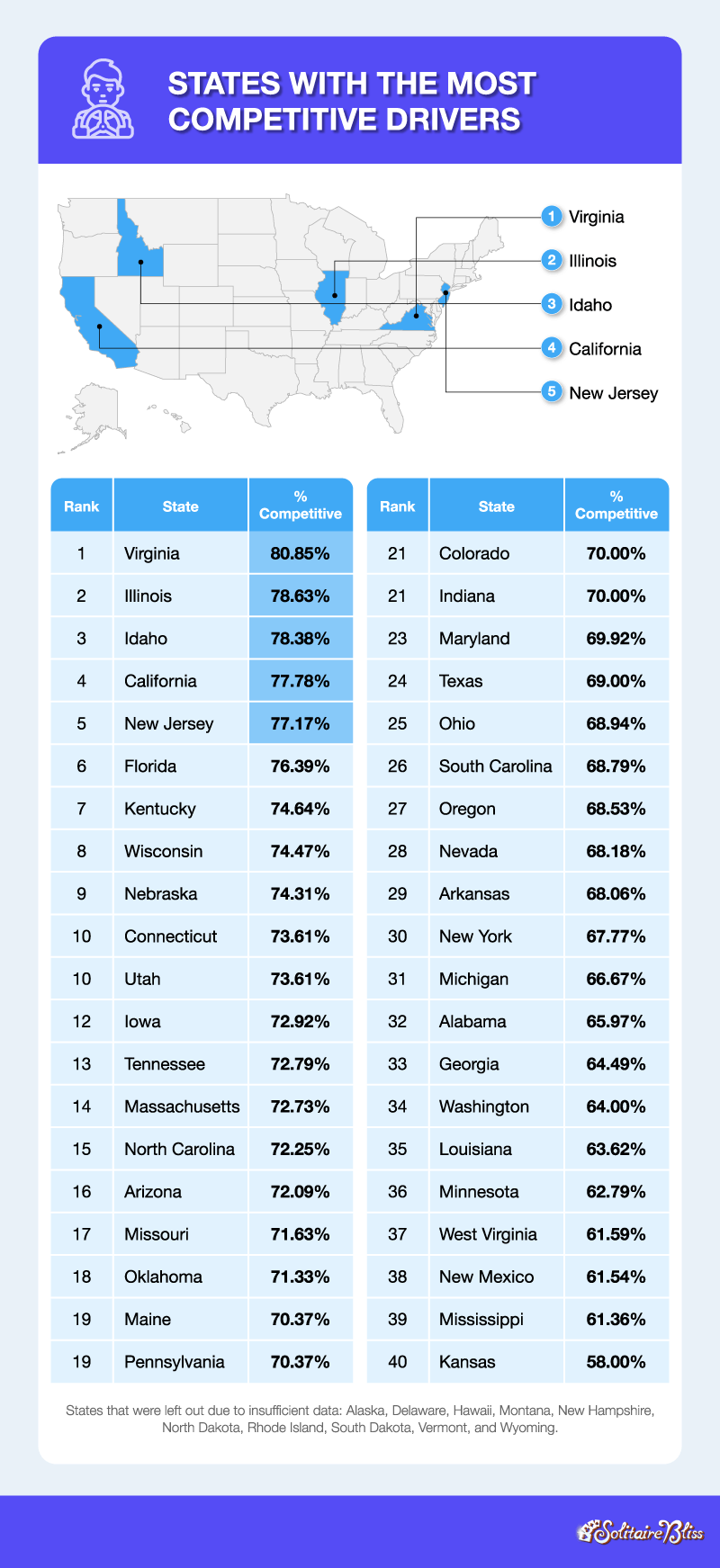
Gen Z Is the Most Competitive With Health and Fitness
A significant 48% of Americans openly admit that they've felt motivated to work harder on their diet and fitness routines because of someone else's success. Women (49%) seem to be slightly more likely to embrace this competitive edge in matters of health and fitness compared to men (47%). Across generations, it's the younger crowd leading the charge, with millennials and Gen Z (52%) being the most inclined to be competitive in this domain, followed by Gen X (44%), and boomers (37%) trailing behind.
For those who attend fitness classes, the competition extends to the studio, with 1 in 6 positioning themselves strategically to monitor others' progress, ensuring they're not being outperformed. This reveals a covert layer of competition even within the camaraderie of group workouts.
In terms of states where the competitive spirit in health and fitness shines brightest, New Jersey (33.25%) takes the lead, followed closely by Tennessee (31.45%) and Alabama (29.25%).
Conversely, states with the least competitive health environments foster a more relaxed approach to wellness. Kansas (12.89%) leads the pack, trailed by Wisconsin (15.14%) and Oklahoma (15.53%).
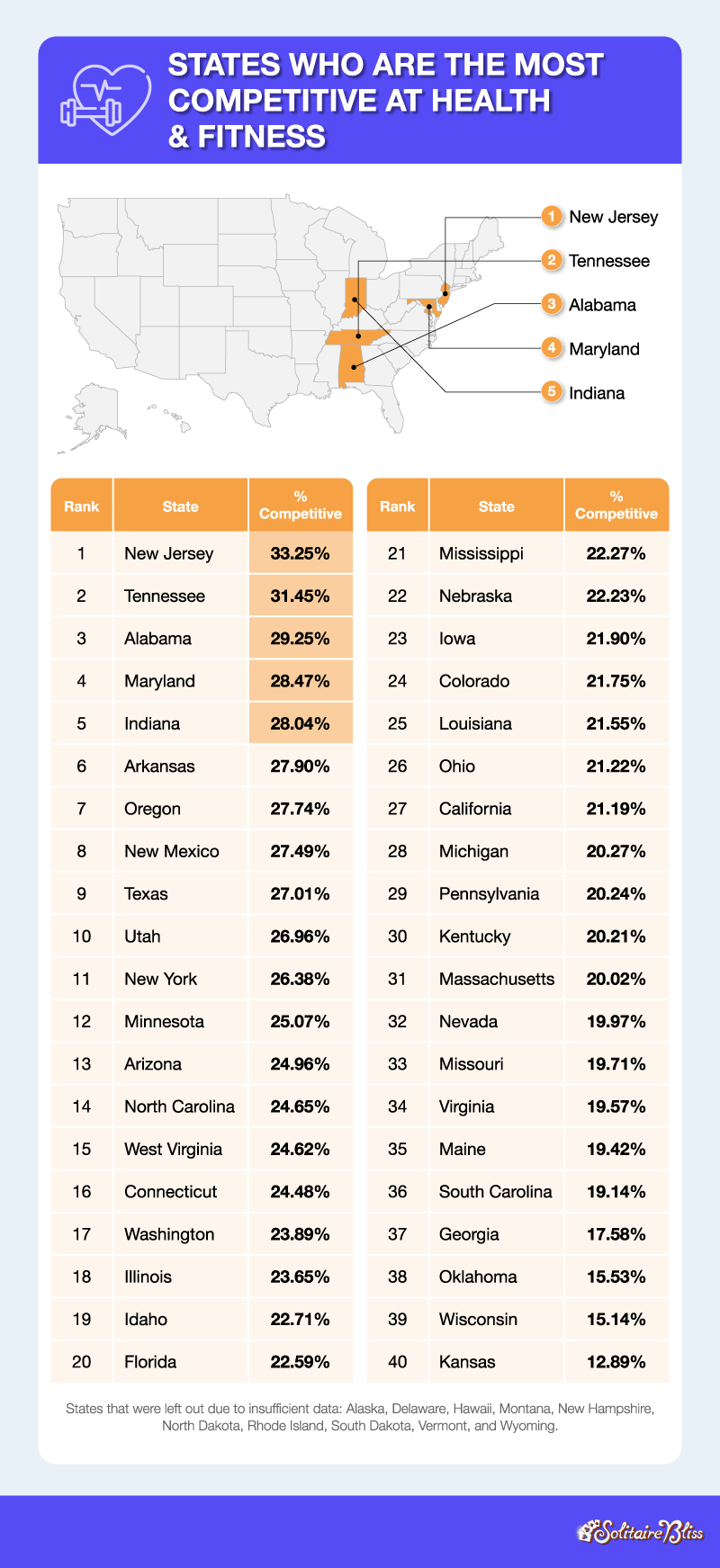
1 in 6 Buy Luxury Items Just to Impress Others
Nearly half (46%) of Americans feel a sense of pride when they believe they are financially ahead of their friends and colleagues. Interestingly, men (48%) tend to be slightly more inclined to experience this pride compared to women (45%). This reveals that financial success can often be a source of personal satisfaction and competitiveness.
Taking things up a notch, 1 in 10 individuals admit to bragging about their finances to someone they know makes less than them. Men (13%) are more likely to engage in this form of financial boasting than women (7%). Among generations, millennials (12%) take the lead in this category, followed by Gen X (10%), Gen Z (8%), and boomers (5%).
The competitive edge extends further as over 1 in 6 Americans have purchased luxury items primarily to impress others. Men (1 in 5) are slightly more prone to this behavior than women (1 in 6). Generationally, millennials (21%) lead the pack when it comes to buying luxury items for the purpose of impressing others, followed by Gen Z (18%), Gen X (16%), and boomers (7%).
Turning our attention to states where financial competitiveness is most pronounced. Illinois (34.01%) takes the lead followed by New York (32.67%) and New Jersey (31.33%).
On the flip side, states with the least competitive financial environments tend to foster a more relaxed attitude toward wealth. Idaho (13.33%) leads the way in promoting a laid-back approach to financial well-being. Mississippi (15.60%) and Arkansas (16.00%) follow suit, emphasizing a more content attitude toward personal finances.
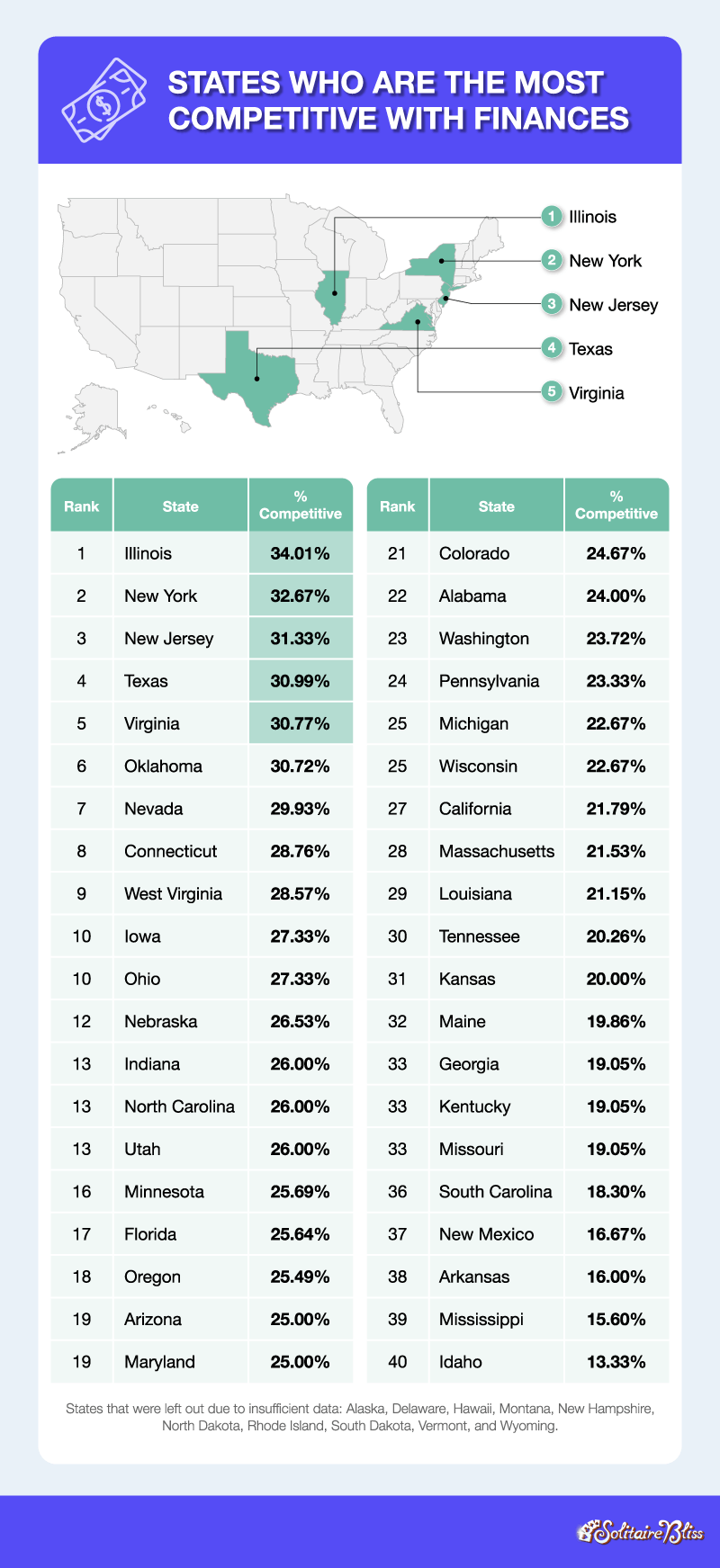
Take a Breather
Rushing to be first might seem exhilarating, much like the thrill of achieving a new high score in the game of solitaire. But just as in solitaire, where every card placement is a reflection of one's foresight and decision-making, life too is a game of choices and consequences.
In solitaire, it's not a race against others. It's you, the cards, and the strategies you choose. The true victory? Not just reaching the end, but mastering the game with your best moves.
So, when the world feels like it's spinning too fast, pause and dive into a game of online solitaire. Challenge yourself and remember: it's less about outpacing others and more about outdoing your past self. Ready to play? Dive into a new game now and be your own competition.
Methodology
We established a series of survey questions that focused on competitive behaviors. We scored each state on these questions to determine a score out of 100. From there, we analyzed the numbers by state and ranked them accordingly.
We surveyed 1,987 Americans from September 29 to October 6, 2023. Respondents ranged in age from 18 to 76 years old, and were 49% female, 49% male, and 2% nonbinary.
States that were left out of our ranking due to insufficient data were Alaska, Delaware, Hawaii, Montana, New Hampshire, North Dakota, Rhode Island, South Dakota, Vermont, and Wyoming.
Back to the Homepage



